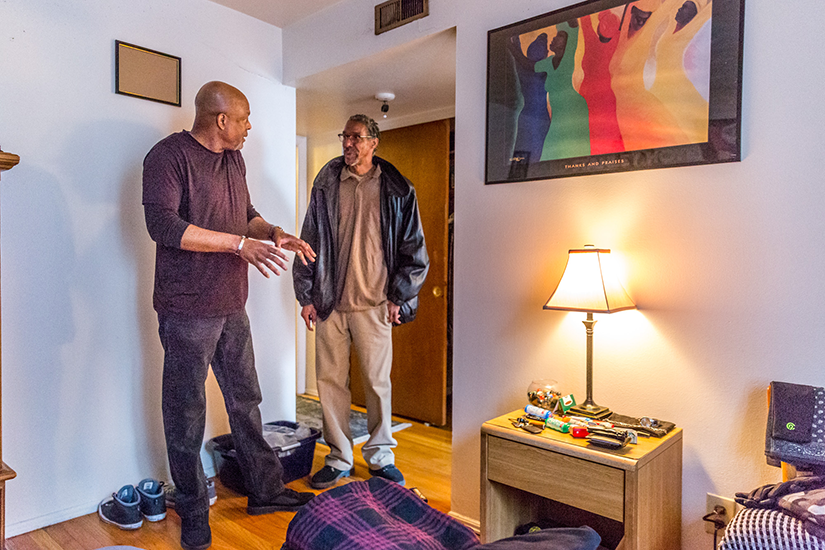At an apartment in south St. Louis, Jerome Arnold greeted Phillip Melton as if they were old friends. But they’d only met a month earlier, after Melton had been released from prison.
Melton told Arnold that the move was simple, he’d unpacked and even lost weight. Most importantly, he hadn’t had an alcoholic drink since he left prison.
“Way to go,” Arnold praised Melton, referring to him as, “a good man, a good person, not a hassle.”
As a case manager with the Criminal Justice Ministry of St. Louis (CJM), Arnold checks up on Melton and assists him and other men in the Rent to Release housing program for military veterans. Arnold empathizes with the clients — in 2012 he was homeless, on probation on a drug conviction, struggling with addiction and probably on his way back to prison when he got help from the ministry.
“CJM literally changed my life,” Arnold said. “I was a convicted felon. CJM gave me a second chance to get my life together.”
 Jerome Arnold, left, a case manager at the Criminal Justice Ministry, took client Chris Meyer shopping. After receiving assistance from the ministry, Arnold described his work as a case manager there as a dream come true, and since January has been helping veterans reintegrate into society.Photo Credits: Lisa Johnston | [email protected] | twitter: @aeternusphoto
Jerome Arnold, left, a case manager at the Criminal Justice Ministry, took client Chris Meyer shopping. After receiving assistance from the ministry, Arnold described his work as a case manager there as a dream come true, and since January has been helping veterans reintegrate into society.Photo Credits: Lisa Johnston | [email protected] | twitter: @aeternusphotoArnold was checking fire extinguishers and smoke detectors in CJM-rented apartments March 1 when he met with Melton. “He’s been there for me,” Melton said. “If I have issues, I call.”
When Arnold reminded Melton not to make “stupid decisions,” the fellow Army vet nodded, adding that “I’ve made my share of them.” Arnold patted him on the back, told him how proud he was of him and encouraged him to persevere.
Arnold’s work with the Criminal Justice Ministry is “a dream come true,” he said.
He had struggled with addiction for 20 years and “everybody gave up on me,” he said. But he met with Sarah Pride, previously with the Criminal Justice Ministry, who showed confidence in his recovery. “She saw something in me that I didn’t see in myself,” Arnold said. “That hadn’t happened in a long time.”
Pride told him she’d help if he got treatment and stopped using drugs. “I took a step of faith and believed in her,” he said, noting that previously he had tried to change on his own, often afraid to ask for help.
Arnold, now 56, entered a treatment program, lived in transitional housing for a couple months and then entered the Criminal Justice Ministry program. He had two case managers, including Aaron Laxton, who now is director of community relations. “He inspired me to do what I do. He allowed me to become who I am,” Arnold said.
(Sarah Pride) saw something in me that I didn’t see in myself. That hadn’t happened in a long time.
Laxton helped Arnold stay off drugs and follow rules. CJM offered him a chance to take care of all of his problems at once — legal, addiction, housing.
Laxton gives Arnold the credit for his achievements. “He always had a vision of what he wanted to do if given the opportunity,” Laxton said. “It made it easy for me as a case manager. I walked alongside him, but he did the heavy lifting.”
His former client was persistent in seeking a staff position at the ministry, Laxton recalled. Once CJM expanded, “he was one of the first people I thought of,” Laxton said. “We believe it was kind of Divine intervention.”
Arnold developed attainable short-term, mid-term and long-term goals, and a CJM staff member reviewed those with him quarterly. The ministry “taught me to believe in myself and don’t quit,” Arnold said.
Other men whom he met in the program also are now living independently, employed, drug- and alcohol-free and have no negative interactions with the law. He stopped associating with people who use drugs or break the law and is active in a 12-step program.
 Jerome Arnold, right, checked in with Marine veteran Ron Clark on March 12 at Clark’s apartment. “I keep everything tidy and in order,” Clark said. “When I read the good book, God is a God of order, and I want to live that way.”Photo Credits: Lisa Johnston | [email protected] | twitter: @aeternusphoto
Jerome Arnold, right, checked in with Marine veteran Ron Clark on March 12 at Clark’s apartment. “I keep everything tidy and in order,” Clark said. “When I read the good book, God is a God of order, and I want to live that way.”Photo Credits: Lisa Johnston | [email protected] | twitter: @aeternusphotoArnold said it was hard to make new friends and to trust people. Eventually he got together with other men in the program, having fun without drugs or alcohol. Arnold also went to college, got an associate’s degree in human services, a certificate in addiction study and learned how to handle issues specific to veterans such as post-traumatic stress. Before joining the staff of the Criminal Justice Ministry, he worked as an addiction counselor. He also worked rehabbing homes, including his home. He enjoys travel — something he didn’t do previously — and spending time with his two dogs.
Laxton relates the Criminal Justice Ministry’s work to the Gospel about the Prodigal son. “When you honor the worth of the person, that person begins to heal and becomes the person they’re truly meant to be. Jerome is the best example of that.”
CJM gives its clients hope by treating them with dignity, self-respect and worth, Laxton said. “Society has given up hope on them and oftentimes they’ve given up hope in themselves,” he said.
Arnold works with 15 veterans now, helping them on their bigger issues and little things such as saving money. “I get to give back what CJM gave me,” he said. “I try to encourage them, let them know I believe in them, that they can become independent. I’ve been through what they’ve been through.”
He also lets them know that the people who help fund the ministry, including the Archdiocese of St. Louis through the Annual Catholic Appeal, also believe in them. He urges clients to be accountable. “That’s what these guys need to learn. If you’re accountable, you become responsible. If you’re responsible, you become productive, not just in your own life but in society.”
Recognition
The
Second Annual Criminal Justice Ministry Recognition Dinner will be held
from 6-9 p.m. Thursday, April 12, at the Centennial Ballroom at Moulin,
2017 Chauteau Ave. in St. Louis.
The dinner will recognize Bob
Fox, co-founder of the Clark-Fox Family Foundation; Dr. Carrie
Pettus-Davis, director of the Institute for Advancing Justice Research
and Innovation at Washington University in St. Louis; and Guy Slay,
president of Mangrove Redevelopment.
The ministry’s mission is to
improve communities by supporting and empowering people impacted by
incarceration. Its re-entry housing programs provide year-long
supportive housing and wrap-around services. A volunteer network
provides services to incarcerated individuals in four prisons, 10 jails
and one transition center. Direct services provide items to address
immediate needs for returning citizens. Another program helps housing
clients learn business skills and create pet-friendly items to sell at
local markets and fairs. And an advocacy program offers presentations to
groups and contacts with legislators.
For information about the Criminal Justice Ministry, visit www.cjmstlouis.org. For information or to register for the dinner, visit www.stlouisreview.com/jpC or call (314) 652-8062.
Raise the Age
On March 8, the Missouri Senate voted 31-0
for SB 793, a measure known as “Raise the Age” that would raise the age
of adult sentencing from 17 to 18 years old. The bill now goes to the
House of Representatives, where Rep. Nick Schroer (R-St. Charles) has a
companion bill (HB 1255) that has also passed out of committee.
In
speaking for the bill, Sen. Wayne Wallingford, R-Cape Girardeau, noted
how youth sentenced at 17 as adults become graduate students of crime
when they encounter older individuals who are incarcerated. Youth are
also prone to physical and sexual abuse when housed with older inmates.
The measure as passed included two new provisions: A fee of $3.50 to
file civil lawsuits to help fund juvenile courts; and allow children who
were trafficked and subjected to charges of prostitution to have their
records expunged.
The Missouri Catholic Conference is among
supporters of state legislation that would require children up to the
age of 18 to be prosecuted for criminal offenses in juvenile court
unless the child is certified as an adult. Missouri is one of only five
states that still automatically treats 17-year-olds as adults
In
another matter, the Missouri House and Senate Judiciary Committees heard
two bills relating to the administration of criminal justice. Relying
heavily on the findings of the Justice Reinvestment Task Force called by
the governor, SB 966, sponsored by Sen. Caleb Rowden, R-Columbia, and
HB 2397, sponsored by Rep. Shamed Dogan, R-St. Louis, laid out numerous
changes. Among the provisions of the bills are easier access to crime
victim funds, establishment of community behavioral health centers,
adoption of a streamlined, validated assessment for parole purposes, and
a new jail payments structure.
Several members of the Justice
Reinvestment Task Force spoke in favor of the bill, including the
director of the Department of Corrections, the head of the Parole Board,
the head of the Public Defenders Office and the head of the Department
of Mental Health. The witnesses spoke of the underlying need to make
changes in the justice system, most noting that without changes,
Missouri will be faced with building two new prisons by 2020. The
Missouri Catholic Conference testified that the components in the bill
embodied restorative justice principles advocated by the Catholic
Church.